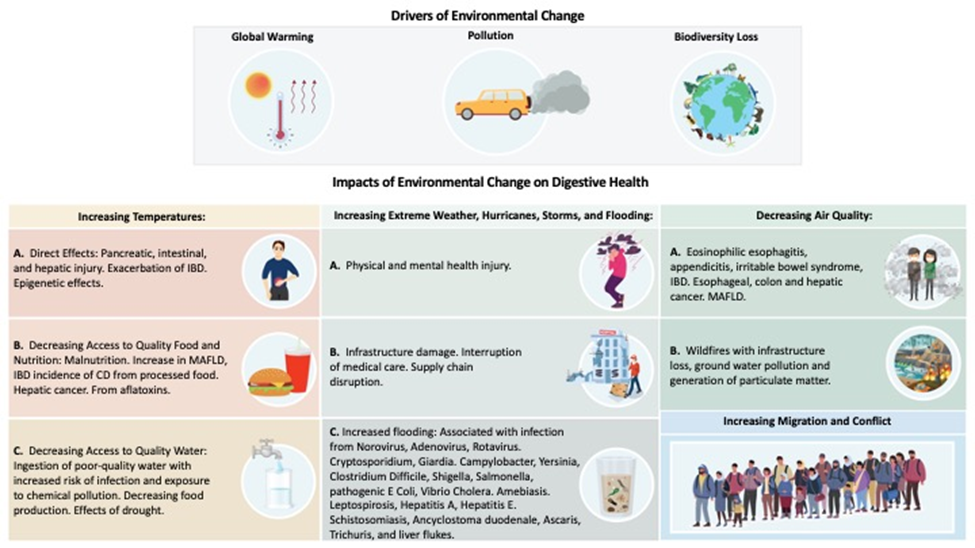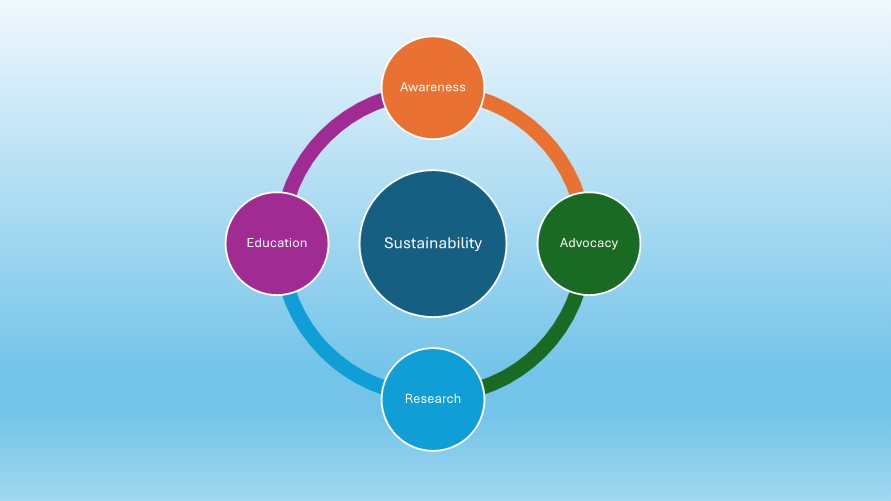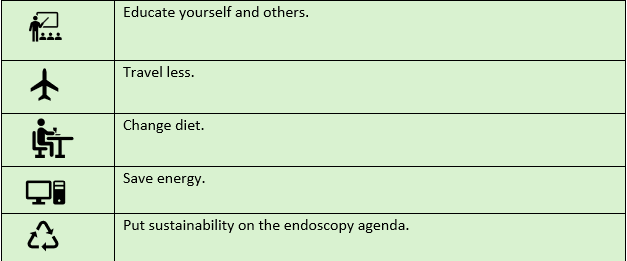The World Gastroenterology Organisation Climate Change Committee: Meeting the Challenge of Environmental Change
Vol. 29, Issue 2 (June 2024)
 |
Desmond Leddin, MB, MSc, FRCPC, FRCPI
Dalhousie University
Chair, WGO Climate Change Committee
Halifax, Canada
|
 |
|
Anahita Sadeghi, MD
Tehran University of Medical Sciences
Vice Chair, WGO Climate Change Committee
Tehran, Iran
|
|
 |
Rui Jorge Guedes Morais, MD
Gastroenterology Department, Centro Hospitalar Universitário de São João
Faculty of Medicine,University of Porto
Porto, Portugal
|
Objectives
The purpose of this report is to raise awareness in the global digestive health community of the implications of environmental change for digestive health, to outline the steps which are being taken by the World Gastroenterology Organisation (WGO) and to suggest some actions which you can take.
Background
The atmosphere is the thin layer of gas which surrounds the earth. It is a narrow band and when flying at 10,000 meters almost all of it is between you and the ground. The atmosphere has been warming steadily since the onset of industrialization. The gases released by extraction and combustion of fossil fuels, and those released from other processes, such as manufacturing, agriculture, and healthcare, have warmed the atmosphere by holding back heat, which would normally be radiated into space. Currently, global mean surface temperature is over 1°C above pre-industrial measurements.1, 2
A 1° change in temperature may not seem like much, but it represents a huge change in the amount of energy retained in the atmosphere and oceans. It is more than sufficient to lead to global changes in regional temperatures, weather patterns, and precipitation. It is enough to raise the level of the oceans thereby threatening island states and coastal communities.
Environmental change is not confined to changes in global temperature. The burning of fossil fuels, agriculture, and industrial processes release large amounts of pollutants. In addition, biodiversity, the variety of all the living creatures and plants on the planet, is in decline under the twin threats of climate change and pollution. Wider biodiversity is important in preventing disease, ensuring access to clean water, and ensuring the growth of agricultural crops.2, 3
Lower income countries are particularly vulnerable to environmental change because they are often located in the regions, which will be most severely affected.4 In addition, lower income countries are less able to withstand the damage posed by infrastructure loss due to extreme weather events and the consequences arising from decreased access to water and crops.
Effects of Environmental Change on Health
The health effects of environmental change have primarily been linked with respiratory and cardiovascular disease, but digestive health is also affected.5 On a societal level, changes in temperature, rainfall, and the frequency and severity of storms are already affecting access to the fundamentals of life - water, nutrition, and shelter. On an individual level virtually every part of the digestive system can be affected either by environmental change. This topic has recently been reviewed in detail.6

Figure 1. The effects of the three main drivers of environmental change on digestive health. Global warming, pollution and biodiversity loss are driving Increasing temperatures, increasing extreme weather, and decreasing air quality. These is turn are affecting digestive health and disease. References for each of the conditions listed can be found in a recent narrative review.6
For each of the conditions listed in Figure 1 there is plausible, albeit not definitive, evidence of a connection between environmental change and digestive health. Air pollution is emerging as a particular concern. Particulate matter (PM) refers to a wide variety of microscopic particles which are suspended in the air. These vary in composition and size. They can be inhaled and cross into the blood circulation, or they can be ingested and reach the gastrointestinal tract. PM has been linked to a variety of digestive diseases, including esophageal cancer.7 Plastic pollution is now ubiquitous and can be found in stool samples and in the intestinal wall.8 It is not yet clear what the effects may be, but they may have a role in intestinal disease.9
Effects of healthcare on the Environment
While environmental change is affecting health, the converse is also true, healthcare delivery is affecting the environment. Healthcare is responsible for 5% or more of greenhouse gas emissions in some countries.10 Much attention has been focused on endoscopy since it is a high-volume procedure and associated with the generation of a considerable amount of emissions and waste.11-13 The carbon footprint and the amount of emissions associated with endoscopy are becoming clear. Travel to and from the endoscopy suite by patients and staff and the energy required to run the endoscopy suite are both major contributing factors.14 Waste and the carbon emissions associated with the use of disposables are also important, however these issues are not as significant even if more apparent. Several national peer societies and endoscopy groups have issued guidance on how to reduce the environmental impact of endoscopy.15-20
Physician Engagement
Even though environmental change represents a major public health threat, physicians have been slow to engage. There are many reasons why this needs to change.21 There is the issue of intergenerational justice. It is not fair nor just to live beyond our means now and let future generations deal with the problems we have created. As physicians, we have an ethical duty to not harm patients. We know that pollution, global warming, and biodiversity loss associated with healthcare are all harming patients. Therefore, it follows that we must do as much as we can to reduce this. It makes financial sense, and it is simply good management to practice sustainable healthcare.22 Finally, it is in our self-interest. If we do not bring this problem under control, then it will have very severe implications for future generations of our societies and our individual families.
WGO recently conducted a survey of global gastroenterology leadership.23 Several obstacles to physician engagement were identified including financial blocks, psychological factors, and systematic issues such as a lack of education. Many of these can be overcome through a combination of education, raising awareness, and systems change.
Global Response
The world is responding and peak carbon emissions per capita may have already been reached.24 Emissions are falling quickly in many countries, although overall they continue to rise. The global gastroenterology community has also begun to mobilize with education of digestive health practitioners and raising awareness becoming clearer priorities.25 WGO organized a series of webinars on the topic in 2023 and published summarized versions of the key takeaways.26 This course was a comprehensive overview of the problem and could serve as a curriculum for individuals and societies who wish to learn more.
Mission of the WGO Committee
Recently, WGO has established the Climate Change Committee with a wide global representation. The mission of the committee is sustainability at the center and has four outside pillars - education, research, advocacy, and raising awareness. (Figure 2).

Figure 2
The mission of the WGO Climate Change Committee. At the center of the committee’s activities is sustainability. Movement towards that objective is supported by the four pillars of raising awareness, advocacy, research, and education.
Education
In alignment with our commitment to education and heightened awareness, WGO will continue its successful webinar series, addressing pivotal topics and providing various educational resources. These resources include slide decks and personal stories from gastroenterologists worldwide that showcase sustainable practices in their professional and personal lives.
- Webinar Series: We plan to host a seasonal webinar series. The first session titled "Navigating Sustainable Endoscopy Practices," was launched to coincide with the celebration of World Earth Day on April 22, 2024. This initiative is intended to appeal to a diverse audience, including physicians—particularly gastroenterologists—GI fellows, medical students, and nursing staff. Each 60-minute webinar will feature two experts leading talks followed by a Q&A session, ensuring a comprehensive discourse on pressing matters.
- Global Outreach: We encourage all GI societies to establish their own climate committees and integrate climate change sessions into their national congresses, fostering a unified approach towards sustainability within the field.
Awareness
Social media has become an integral part of our society and our daily life, being used by billions of people.27 Considering the previously described difficulties in encouraging greater action by physicians regarding the adoption of sustainable practices, WGO considers that social media may be a significant tool to help raise awareness not only among physicians but also among the general population on this topic. The possible impact is expected to be more significant among younger generations, which are precisely the ones that are in a good position to act and further develop efforts to avoid further consequences of environmental change.
- We plan to focus mainly on Instagram, currently the most used social media platform, with a defined plan:
- Critical review and sharing of relevant articles on the topic
- Sharing tips and tricks for greener gastroenterology/endoscopy practice.
- Interviews with experts on topics
- Sharing real life stories around the world that had an impact on sustainability
Research
There is a great deal of research activity on environmental change and digestive health. It involves learning about new disciplines such as including life-cycle analysis and engineering, which are not traditionally part of the medical curriculum. WGO research activities to date have been primarily concerned with understanding the needs of the global digestive health community but the plan is to engage in original data procurement.
Advocacy
Physicians are in an excellent position to advocate for people who do not have an effective voice of their own. The WGO climate committee's advocacy efforts will be based on raising awareness, educating digestive health providers, and conducting targeted research.27
Moving to Action
Healthcare providers can act at different levels, from micro (family and friend networks) to meso (community and regional scale), and macro (national and global policy). Physicians are role models in society and are trusted to act in the best interests of their communities. The scale of engagement clearly influences the impact of the intervention, and the scale is also determined by the position of the healthcare provider. An individual physician, for example, might engage only on a micro scale and that will have an impact within the family unit. That may seem small, but small actions can be very meaningful.28 Children and teenagers are more vulnerable to the stress associated with the relentless barrage of bad news and images related to climate change.29, 30 Even if we can't bring about a global change, acting on a personal level will send a message to family and friends that this issue matters and that we are making a sincere effort.
As professionals in the field of endoscopy and health systems, we can make a significant impact by implementing even small changes in our practices.31 These changes can trigger a larger-scale shift in the system, creating a ripple effect that may inspire others to act. Those who possess greater influence in the digestive health community can even bring about global change, altering the culture and promoting action on a national and international level.

Figure 3. Five actions which can be instituted quickly and will have an immediate impact.
Five Actions You Can Take Now
Figure 3 shows potential actions, which can be taken in personal and professional life to have an immediate impact on reducing carbon footprint. There are many others which can be taken, but we have chosen five representative actions that are feasible and impactful.32
The carbon footprint of an individual, the total carbon dioxide emissions for which we are responsible, is made up of all the components of living including food, clothing, shelter, travel, and consumables. The average per capita carbon footprint varies enormously by country.33 The global average is about 4.7 tons(t) of carbon dioxide per person per year, in low-income countries it is 0.3 t while in North America it is 10.5t.
If you want to take the first steps, here is what you can do.
- Educate Yourself and Others
Gaining and sharing knowledge on this issue is the first step towards generating solutions. The WGO has prepared a series of webinars on the subject and published the contents. This is a comprehensive review of the subject and a more than sufficient foundation. They can be accessed here. (https://www.worldgastroenterology.org/education-and-training/webinars/wgo-climate-course-for-global-gastroenterology)
- Reduce Travel
The emissions associated with travelling by car or plane are amongst the most environmentally harmful actions most people take. Travel by car or plane emits roughly 170g of CO2e per kilometer, although emissions do vary by car type and flight distance.34 It is not often feasible for people to change their daily travel patterns and get away from cars, but it is often possible to reduce the amount of air travel. You could lobby your national peer to allow hybrid meetings, instead of in person meetings, thus reducing air travel.35 The Canadian Association of Gastroenterology reduced travel related emissions to some of its annual meetings by over 40% simply by changing the geographic location.36 In the United States, car and airline travel accounted for nearly half of the annual emissions of an academic gastroenterologist, so this is an area where environmental wins can be obtained.
- Change Diet
The carbon footprint of different foods varies considerably. Beef production generates nearly 60 kg of greenhouse gases (GHG) per kg of meat. Peas and nuts, as an example, generate less than 1 kg per of GHG per kg of food.38 In addition, the clearing of forest to produce pastureland for cattle decreases biodiversity, and the runoff manure associated with cattle farming is a potent source of water pollution. The Lancet - EAT commission has published a diet which is good for both human and planetary health.39
- Save Energy
Home energy is a significant contributor to household carbon footprint. There are many steps which can be taken to reduce this, including reducing heating and cooling, improving insulation, switching to LED lights, and changing clothes washing cycles.40 Endoscopy uses considerable amounts of energy for lighting, heating and ventilation, processors, and computers. Estimates very between studies but is around 2.7 kWh per endoscopy.12 The energy usage of endoscopy units can be reduced by changing lighting, making sure the equipment is turned off when not in use, and changing the temperature and air conditioning settings. These actions can become part of the sustainability plan for the unit.
- Add Sustainability to Endoscopy Management
Once sustainability is on the agenda, environmental considerations may be factored into decisions on care provision, energy savings within the institution, temperature and air conditioning setbacks, and procurement. Telemedicine has been shown to be acceptable to patients, associated with good healthcare, and capable of producing significant reduction in emissions.41 In one report from Ontario, Canada over 3 billion km in travel was saved over the course of a 22-month period.42 Pre-procedure consultation and post procedure followed up by video or phone would have a significant impact on the reduction of endoscopy unit emissions.
Summary
Environmental change is now recognized as a contributing factor to the incidence and exacerbation of digestive disease. Paradoxically delivery of digestive healthcare is contributing to the problem. There are many actions which individuals can take. Moving the global digestive health community to a more sustainable practice will be facilitated by research, education, raising awareness and advocacy. Considerable progress has already been made. WGO, by working with its global network of member organizations, is committed to helping the digestive health community meet the challenge.
References
1. Leddin D, Montgomery H. The fundamentals: understanding the climate change crisis. Gut. 2023;72(12):2196-8.
2. Johns T, Eyzaguirre PB. Linking biodiversity, diet and health in policy and practice. Proc Nutr Soc. 2006;65(2):182-9.
3. Tollefson J. Why deforestation and extinctions make pandemics more likley. Nature. 2020;584:2.
4. Makharia GK, Sadeghi A, Leddin D, Costello A. Impact of climate change on vulnerable populations. Gut. 2023;72(12):2201-4.
5. Donnelly MC, Talley NJ. Effects of climate change on digestive health and preventative measures. Gut. 2023;72(12):2199-201.
6. Leddin D. The impact of climate change, pollution and biodiversity loss on digestive health and disease. Gastro Hep Advances. 2024.
7. Sun D, Liu C, Zhu Y, Yu C, Guo Y, Sun D, et al. Long-Term Exposure to Fine Particulate Matter and Incidence of Esophageal Cancer: A Prospective Study of 0.5 Million Chinese Adults. Gastroenterology. 2023;165(1):61-70.e5.
8. Yan Z, Liu Y, Zhang T, Zhang F, Ren H, Zhang Y. Analysis of Microplastics in Human Feces Reveals a Correlation between Fecal Microplastics and Inflammatory Bowel Disease Status. Environmental Science & Technology. 2022;56(1):414-21.
9. Hirt N, Body-Malapel M. Immunotoxicity and intestinal effects of nano- and microplastics: a review of the literature. Particle and Fibre Toxicology. 2020;17(1):57.
10. Lenzen M, Malik A, Li M, Fry J, Weisz H, Pichler PP, et al. The environmental footprint of health care: a global assessment. Lancet Planet Health. 2020;4(7):e271-e9.
11. Pohl H, Baddeley R, Hayee B. Carbon footprint of gastroenterology practice. Gut. 2023;72(12):2210-3.
12. Gayam S. Environmental Impact of Endoscopy: "Scope" of the Problem. Am J Gastroenterol. 2020;115(12):1931-2.
13. Desai M, Campbell C, Perisetti A, Srinivasan S, Radadiya D, Patel H, et al. The Environmental Impact of Gastrointestinal Procedures: A Prospective Study of Waste Generation, Energy Consumption, and Auditing in an Endoscopy Unit. Gastroenterology. 2024;166(3):496-502.e3.
14. Lacroute J, Marcantoni J, Petitot S, Weber J, Levy P, Dirrenberger B, et al. The carbon footprint of ambulatory gastrointestinal endoscopy. Endoscopy. 2022;55:918 - 26.
15. Cunha Neves JA, Rodríguez de Santiago E, Aabakken L. Approaches for greening endoscopy and reducing waste. Gut. 2023;72(12):2204-6.
16. Sebastian S, Dhar A, Baddeley R, Donnelly L, Haddock R, Arasaradnam R, et al. Green endoscopy: British Society of Gastroenterology (BSG), Joint Accreditation Group (JAG) and Centre for Sustainable Health (CSH) joint consensus on practical measures for environmental sustainability in endoscopy. Gut. 2023;72(1):12-26.
17. Hernandez LV, Agrawal D, Skole KS, Crockett SD, Shimpi RA, von Renteln D, Pohl H. Meeting the environmental challenges of endoscopy: a pathway from strategy to implementation. Gastrointestinal Endoscopy. 2023;98(6):881-8.e1.
18. Henniger D, Lux T, Windsheimer M, Brand M, Weich A, Kudlich T, et al. Reducing scope 3 carbon emissions in gastrointestinal endoscopy: results of the prospective study of the 'Green Endoscopy Project Würzburg'. Gut. 2023.
19. Rodríguez de Santiago E, Dinis-Ribeiro M, Pohl H, Agrawal D, Arvanitakis M, Baddeley R, et al. Reducing the environmental footprint of gastrointestinal endoscopy: European Society of Gastrointestinal Endoscopy (ESGE) and European Society of Gastroenterology and Endoscopy Nurses and Associates (ESGENA) Position Statement. Endoscopy. 2022;54(8):797-826.
20. Cunha Neves JA, Roseira J, Queirós P, Sousa HT, Pellino G, Cunha MF. Targeted intervention to achieve waste reduction in gastrointestinal endoscopy. Gut. 2022;72:306 - 13.
21. Desmond L. Should environmental sustainability be a priority for the gastroenterology community? Frontline Gastroenterology. 2024:flgastro-2023-102567.
22. Wedmore F. How to save £20 000 and 780 staff hours a year on a single ward—by making one climate friendly change. BMJ. 2023;381.
23. Leddin D, Omary MB, Metz G, Veitch AM. Climate change: a survey of global gastroenterology society leadership. Gut. 2022.
24. Ritchie H. Not the End of the World: How we can be the first generation to build a sustainable planet. New York: Little Bron Spark; 2024.
25. Leddin D, Omary MB, Veitch A, Metz G, Amrani N, Aabakken L, et al. Uniting the Global Gastroenterology Community to Meet the Challenge of Climate Change and Non-Recyclable Waste. Gastroenterology. 2021;161(5):1354-60.
26. Omary MB, Leddin D, Metz G, Veitch AM, El-Omar EM, Macedo G, Perman ML. World Gastroenterology Organisation - Gut commentary series on digestive health and climate change. Gut. 2023;72(12):2193-6.
27. Pawlak KM, Lui RN, Bilal M, Siau K. How to use social media for scientific advocacy and personal branding. United European Gastroenterol J. 2023;11(5):488-91.
28. Gladwell M. The Tipping Point. How little things can make a big difference. New York: Back Bay Books; 2013.
29. Lawrance EL, Jennings N, Kioupi V, Thompson R, Diffey J, Vercammen A. Psychological responses, mental health, and sense of agency for the dual challenges of climate change and the COVID-19 pandemic in young people in the UK: an online survey study. Lancet Planet Health. 2022;6(9):e726-e38.
30. Hickman C, Marks E, Pihkala P, Clayton S, Lewandowski RE, Mayall EE, et al. Climate anxiety in children and young people and their beliefs about government responses to climate change: a global survey. Lancet Planet Health. 2021;5(12):e863-e73.
31. Moore C, Buchanan DA. Sweat the small stuff: A case study of small-scale change processes and consequences in acute care. Health Services Management Research. 2013;26:17 - 9.
32. Ivanova D, Barrett J, Wiedenhofer D, Macura B, Callaghan M, Creutzig F. Quantifying the potential for climate change mitigation of consumption options. Environmental Research Letters. 2020;15(9):093001.
33. Our World in Data. Emissions per capita [Available from: https://ourworldindata.org/co2/country/united-states?country=~USA#per-capita-how-much-co2-does-the-average-person-emit.
34. Our World in Data. Carbon footrprint of travel per kilometer 2024 [cited 2024 March 10]. Available from: https://ourworldindata.org/grapher/carbon-footprint-travel-mode.
35. Ben-Ari T, Lefort G, Mariette J, Aumont O, Jeanneau L, Santerne A, et al. Flight quotas outperform focused mitigation strategies in reducing the carbon footprint of academic travel. Environmental Research Letters. 2024;19(5):054008.
36. Leddin D, Galts C, McRobert E, Igoe J, Singh H, Sinclair P. The Carbon Cost of Travel to a Medical Conference: Modelling the Annual Meeting of the Canadian Association of Gastroenterology. J Can Assoc Gastroenterol. 2022;5(2):52-8.
37. Williams JA, Kao JY, Omary MB. How Can Individuals and the GI Community Reduce Climate Change? Gastroenterology. 2020;158(1):14-7.
38. Our World in Data. Food: greenhouse gas emisions across the supply chain [Available from: https://ourworldindata.org/food-choice-vs-eating-local.
39. Willett W, Rockström J, Loken B, Springmann M, Lang T, Vermeulen S, et al. Food in the Anthropocene: the EAT-Lancet Commission on healthy diets from sustainable food systems. Lancet. 2019;393(10170):447-92.
40. United Nations. Home Energy 2024 [Available from: https://www.un.org/en/actnow/home-energy.
41. de Jong MJ, van der Meulen-de Jong AE, Romberg-Camps MJ, Becx MC, Maljaars JP, Cilissen M, et al. Telemedicine for management of inflammatory bowel disease (myIBDcoach): a pragmatic, multicentre, randomised controlled trial. Lancet. 2017;390(10098):959-68.
42. Welk B, McArthur E, Zorzi AP. Association of Virtual Care Expansion With Environmental Sustainability and Reduced Patient Costs During the COVID-19 Pandemic in Ontario, Canada. JAMA Network Open. 2022;5(10):e2237545-e.







